Star Trek: The Next Generation is thirty years old this month! To celebrate, Redeeming Culture is assembling the finest crew of culture redeemers from all over the internet to investigate the spiritual harmonies in this cornerstone of science fiction.
For more about Trektember, read our preview post. Please note that there are minor plot spoilers for this episode below.
Reed Lackey is back again to talk about season 5, episodes 7 and 8: Unification.
• •
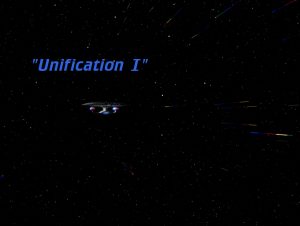
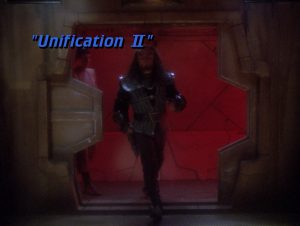 Legacy Star Trek cast members occasionally appeared in episodes of The Next Generation when the narrative opportunities arose (DeForest Kelly in Encounter at Farpoint, and James Doohan in Relics). Their presence acted as a kind of endorsement and blessing on this new Star Trek series while also serving as a fun connective link for long-standing fans. The most popular of these appearances (and one of the highest rated episodes of the show’s entire run) was the two-part story Unification, which featured none other than Leonard Nimoy himself in the role of Ambassador Spock.
Legacy Star Trek cast members occasionally appeared in episodes of The Next Generation when the narrative opportunities arose (DeForest Kelly in Encounter at Farpoint, and James Doohan in Relics). Their presence acted as a kind of endorsement and blessing on this new Star Trek series while also serving as a fun connective link for long-standing fans. The most popular of these appearances (and one of the highest rated episodes of the show’s entire run) was the two-part story Unification, which featured none other than Leonard Nimoy himself in the role of Ambassador Spock.
Recap
The story begins with the suspicion that Spock has defected from the Federation and sided with the Romulan Empire. Picard and Data undertake a mission to pose as Romulans and seek the truth or falsehood of these accusations.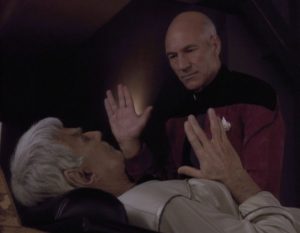 But before their mission begins, Picard meets with Spock’s ailing father Sarek. Sarek shares information that will lead Picard to Spock, but there is also an undertone of the strained relationship Sarek and Spock share. Picard, who has mind-melded with Sarek (in the season 3 episode which shares his name), understands something of the complicated nature of their relationship and hopes to not only uncover the truth of Spock’s presence on Romulus, but connect father and son once again.
But before their mission begins, Picard meets with Spock’s ailing father Sarek. Sarek shares information that will lead Picard to Spock, but there is also an undertone of the strained relationship Sarek and Spock share. Picard, who has mind-melded with Sarek (in the season 3 episode which shares his name), understands something of the complicated nature of their relationship and hopes to not only uncover the truth of Spock’s presence on Romulus, but connect father and son once again.
In reality, Spock’s presence on Romulus is in the hopes of once again reuniting the Romulan and Vulcan cultures, which were once the same people. He is seeking to achieve this action through political diplomacy, but at tremendous personal risk. Upon connecting with Picard (and learning of his father’s death), Spock discovers that unification will be much more difficult to achieve than even he thought possible: a larger ploy is revealed, and the trio of heroes are put at grave risk, with Spock’s image and voice being stolen to present a false perception of his intentions. But the three of them overcome these struggles and all is, of course, as it was by episode’s end.
From a production standpoint, the episode was largely conceived as an opportunity to boost promotion for the upcoming release of Star Trek VI: The Undiscovered Country. I can recall my first viewing of the episode being somewhat disappointed that the pivotal events implied in the premise never really progress; by episode’s end, the characters are largely where they were in the beginning, with Spock hoping for eventual re-unification and Picard and Data returning to the ship to leave him to it. But as I’ve reflected on the episode in the years since, the overwhelming theme of reconciliation has emerged to the forefront of my reflections.
Reconciliation
The story’s writers, Rick Berman & Mark Piller, wisely decided to juxtapose the broader narrative of unification between the Romulans and Vulcans with the more intimate narrative of Spock and Sarek’s troubled relationship. All the while that Spock is pursuing reconciliation between two nations, Picard is pursuing understanding—since reconciliation is no longer possible—between a son and his father.
One of the most vital passages of scripture in my theological framework comes from 2 Corinthians 5:20:
We are therefore Christ’s ambassadors, as though God were making his appeal through us. We implore you on Christ’s behalf: be reconciled to God.
It is a simple command, but a complicated mission. Conflicts extend backwards through countless generations. Roots of hostility and misunderstanding stretch like clenched fingers and cling to old wounds, refusing to forgive or to let go. 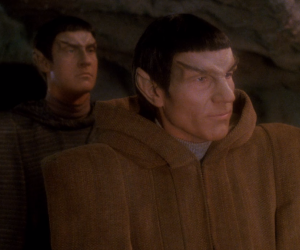 We, as the people of God, have a nearly impossible task of seeking to pursue mutual understanding and bridge the divide between two hostile groups. Those groups may be as expansive as political or cultural ideologies or as intimate as sons and fathers, but our mission remains the same. Not only are we compelled to unite the people, but to implore their reunification once more with the spirit of God Almighty.
We, as the people of God, have a nearly impossible task of seeking to pursue mutual understanding and bridge the divide between two hostile groups. Those groups may be as expansive as political or cultural ideologies or as intimate as sons and fathers, but our mission remains the same. Not only are we compelled to unite the people, but to implore their reunification once more with the spirit of God Almighty.
Reflection
But like Spock, who stood striving for peace between two nations while stubbornly resisting peace within his own household, we must examine our own hearts. We must explore the painful territories of our wounds and our mistreatment and seek with courage and grace to find the strength to forgive. It is a hard and often lonely road towards reconciliation. If you don’t believe me, consider the walk Christ took from Pilate’s hall to Golgotha’s summit.
[pullquote]Reconciliation doesn’t involve dismissing our pain or ignoring our wounds. Rather, it calls for stepping into them with open eyes.[/pullquote]Reconciliation doesn’t involve dismissing our pain or ignoring our wounds. Rather, it calls for stepping into them with open eyes. My favorite moment in either episode is the final invitation Picard gives to Spock: to mind meld with him and gather a small picture of the feelings Sarek held for his son. When Spock accepts this invitation, his face – so frequently stoic and filled with cold, calculating logic – contorts in devastating emotion as he struggles to hold back his tears. It is a small moment, but deeply resonant of the brokenness we so frequently hide behind veils of reason and intellect and implied understanding.
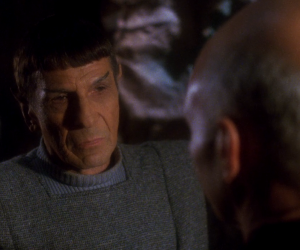 After the futility of their present efforts are resolved, Picard says to Spock, “I wonder if this movement is strong enough to reshape the entire Romulan political landscape.” Spock poignantly replies, “One can begin to reshape the landscape with a single flower, Captain.”
After the futility of their present efforts are resolved, Picard says to Spock, “I wonder if this movement is strong enough to reshape the entire Romulan political landscape.” Spock poignantly replies, “One can begin to reshape the landscape with a single flower, Captain.”
And thus is the work of reconciliation. It is not to stem whole tides of political movements in one decisive action. It is not to silence centuries of painful history with blanket forgetfulness or willful ignorance. It is certainly not the forceful demanding of any group or people or individual to sit down, shut up, or get over it.
It is planting a single flower in desolated soil, and tending to that flower until more can be planted, often one by one.
We are given the opportunities to choose, in each and every moment, whether we will strive towards widening or narrowing the conflicts between one another: in our religion, in our politics, and in our homes. We will not always move the mountain with a single command. Sometimes the mountain is moved one stone at a time, with patience, persistence, and understanding.
Be reconciled to God. Be reconciled to one another. I know the journey is long and the mountain is high, but it can, will, and must be done. Choice by choice.
• • •
Thanks for reading Trektember on Redeeming Culture. Tomorrow, David Atwell brings us his first episode review: Cause and Effect. See you then! Thanks for reading Trektember on Redeeming Culture. Tomorrow, David Atwell brings us his first episode review: Cause and Effect. See you then! Thanks for reading Trektember on Redeeming Culture. Tomorrow, David Atwell brings us his first episode review: Cause and Effect. See you then!
• • •
Reed Lackey is the host of The Fear of God podcast, where he redeems horror films; he can also be heard on the Reel World Theology podcast.



“It is certainly not the forceful demanding of any group or people or individual to sit down, shut up, or get over it.”
Thank you for that. Thank you especially for the ‘any’. It matters.